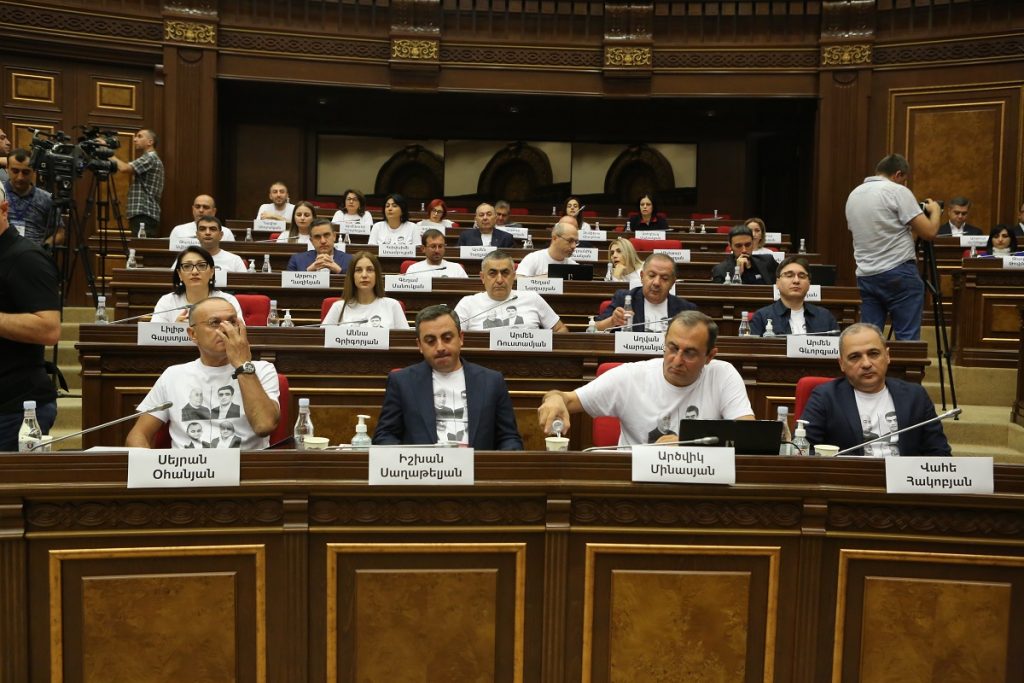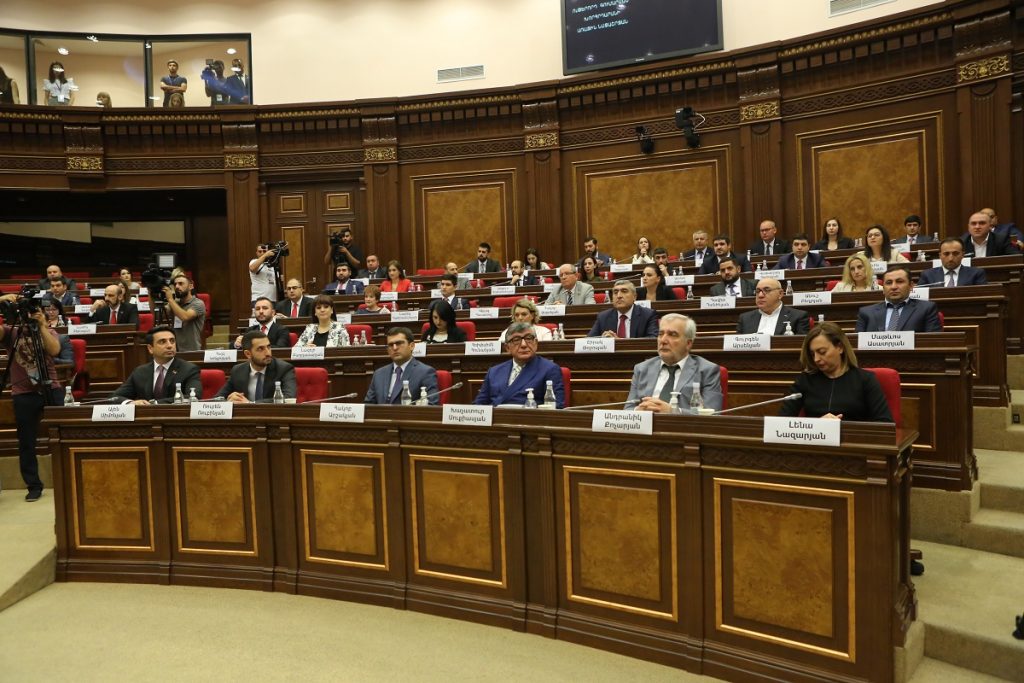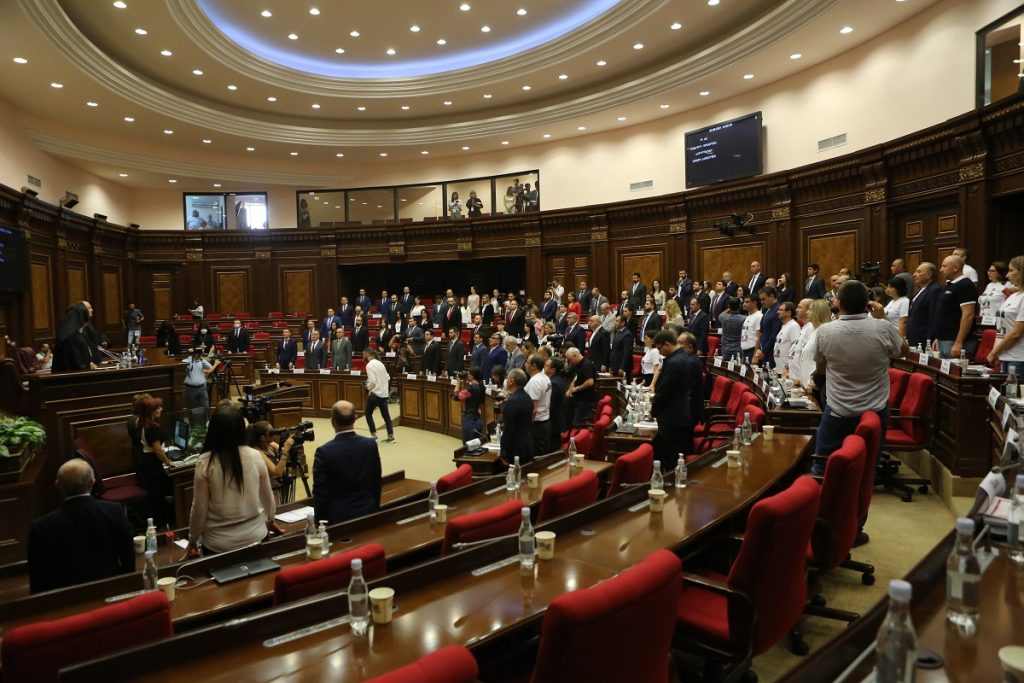Op-ed: does Armenian parliament have any real power?
Numerous parliamentary scandals of the last few days will be remembered by the citizens of Armenia for a long time as the whole country was watching the tensions getting high in the only representative body of the country. Many began to think about the reasons behind the brawls and bottle-throwing among the MPs, wondering if there were carried out specifically to distract people from some more significant issues between the ruling party and the opposition.
- Brawls and injured MP: Armenian parliament discusses government program
- Why freedom of speech remains questionable in post-revolutionary Armenia
- Armenian opposition boycotts first session of the newly elected parliament
Hakob Badalyan, political commentator
The opposition’s stake is on street protests
I do not think that scandals in parliament are arranged in order to divert public attention from the main agenda because people are not particularly focused on it. And today there is a more effective tool for distracting attention – social media.
The opposition, which just ended up in parliament, has relied on this method of struggle due to its lack of a more successful political course.
As soon as they bring serious topics to the agenda, the society has questions about the period of their rule [the parliamentary opposition now represents the forces that have been in power for many years], when the same problems remained unresolved and they can say nothing in response.
Parliamentary elections in Armenia were held on June 20, 2021. They were carried out to overcome the political crisis that followed the defeat in the second Karabakh war. The opposition and its supporters demanded the resignation of Prime Minister Nikol Pashinyan, who signed a document on the cessation of hostilities that was unfavorable for the Armenian side.
In the elections, Pashinyan’s Civil Contract party received 53.92% of the vote, which allowed it to again gain a majority in parliament. Two opposition forces also entered the National Assembly – Hayastan bloc (Armenia), which, during the election campaign, was headed by ex-President of Armenia Robert Kocharian, and the I Have the Honor bloc, which included the parties of another former president Serzh Sargsyan and former head of the National Security Service Artur Vanetsyan.
They cannot explain why in Armenia, it has been stated for so many years that no territories of Artsakh will be surrendered to Azerbaijan, but for 20 years of their rule outside the country, they have been talking about this.
And in the event of a political discussion, the current opposition will be forced to accept its mistakes and answer many awkward questions.
As a result, they will find themselves in an absolutely losing situation. Therefore, the stake is made on the logic of “street showdown”.
The authorities responded in kind, accepted the challenge, showing that they were not afraid of this method. The point is to prove to the opposition that it is unsuccessful in this style too, therefore, they just need to sit down and come to an agreement with the ruling fore.
But it is difficult to say whether it will be possible or not.

Parliament reflects the real picture of the political field
The current parliament, in comparison to the previous ones, is neither good nor bad.
It’s just that there is no established political system in Armenia, no political culture and political traditions.
In the absence of all of the aforementioned factors, there can be no effective parliament a priori. Parliament is what our political system is.
But at the same time, it should be emphasized that this parliament is, by and large, a step forward. Even after the 2018 Velvet Revolution, the National Assembly did not reflect the real “proportion” of the political field back then. And today the picture is closer to reality. We are witnessing a struggle between post-revolutionary forces and the old system.
Ineffective parliament can lead to state failure.
Of course, no one likes the current situation, but it is impossible to change it overnight. It is necessary for political forces to be formed and have them present more attractive proposals to society and change the balance of power in the political field. This is the only way to change the balance of power in the parliament itself.
Unfortunately, today we do not have such forces, there is no alternative to parliamentary forces.
The current parliament, like all previous ones, does not correspond to the challenges facing the country.
And this ineffective body can cause certain failures. Its inefficiency implies consequences. Because we are talking about the number one political body. After all, Armenia is a country with a parliamentary form of government.
It is always possible to change the situation, only there are no such prerequisites yet.

Benjamin Poghosyan, political scientist
Divided Society
The current parliament is the result of that internal political struggle or the heat of passions that began on November 10, 2020. From that day on, the opposition began the struggle against the current authorities and against Prime Minister Pashinyan personally, who signed a trilateral document on the cessation of hostilities in Karabakh.
After the defeat in the war, the Committee for the Salvation of the Motherland appeared, 17 parties united against the Prime Minister, the General Staff issued an accusatory statement, then a tough pre-election campaign for the parliamentary elections began with personal insults.
Society thus split into three:
- Those who consider Pashinyan and all those who voted for him to be traitors, who accuse the prime minister of intending to free himself from Artsakh after coming to power since this is a burden for Armenia, which does not allow Armenia to develop and establish closer ties with Europe, to modernize the state. The same people think that it is because of Artsakh that we turn towards Russia all the time.
- Those who consider Pashinyan to be a ‘saint’. They believe that everything that happened is a consequence of the policies of Robert Kocharian and Serzh Sargsyan, who, long before Pashinyan, agreed with Azerbaijan to surrender Artsakh. They argue that the previous authorities cleverly set up Nikol Pashinyan – the deal was made back in the days of Kocharyan or Sargsyan. They just decided to bring ‘poor’ Pashinyan to power in order to make him the main culprit of all troubles.
- Those who were not particularly interested in the issue of Artsakh. These are people who have not suffered losses – neither human nor economic as a result of the war․ Of course, for them the war with all its consequences is a disaster but very soon they forgot about it and “life goes on” for them. Most of them supported Pashinyan in the elections, citing the fact that until 2018 there was total corruption and other negative phenomena and they do not want that to return.
30% of Armenians consider Pashinyan a traitor
Thanks to the last two categories (ardent supporters of Pashinyan and relatively indifferent to Artsakh), Pashinyan won his 54% of the votes. Nevertheless, up to 30% of the society considers the Prime Minister and his supporters to be the traitors of the Motherland, who, perhaps, did not want to surrender Artsakh through war, but realizing that it was inevitable, did everything to ensure the country’s defeat.
And if up to 30% of society considers those in power to be state traitors, it makes no sense to talk about cohesion or national unity.
In parliament today we have representatives of all circles accusing each other of treason.
Parliamentary props
Despite the adopted parliamentary system, Armenia cannot be considered a parliamentary country.
Since the 90s, all decisions in the country were made by a narrow circle (the president / prime minister and several people from their own narrow circle), and this continues to this day.
The parliament in Armenia has never played, does not play and will not play any role for a long time.
Accordingly, everything that happens in parliament also has no influence on the policy of the state or on its future. The National Assembly cannot make any decisions, even if very intellectual and lengthy discussions take place there.
It plays no role in solving serious issues of the country.
Apathy of society
The attention of the majority of society is not particularly focused on important issues so there is no need to distract it from serious problems with parliamentary scandals. Society is not worried about how to return Shushi [a city in Nagorno-Karabakh which came under the control of Azerbaijan], about the fact that the Azerbaijani Armed Forces occupied Sevlich [a lake in the Syunik region bordering Azerbaijan], or about the shooting in Yeraskh [a village in Ararat region of Armenia].
About 40% of Armenia’s population lives in Yerevan. The second and third largest cities (Gyumri and Vanadzor) are not bordering. Other large cities – Artashat, Echmiadzin, Abovyan, Hrazdan, Charentsavan – are located close to Yerevan and are also safe.
And this is almost 75% of the population of those who are concerned only with the socio-economic situation in the country.
If this situation gets worse, they start to worry about how they should live, how to pay for their utilities, school fees, and so on.
Hardly anything can change the situation, except for a large-scale war with bombs thrown on Yerevan, Gyumri, or Vanadzor, which would make people worry about their safety – and this scenario is highly unlikely.



















